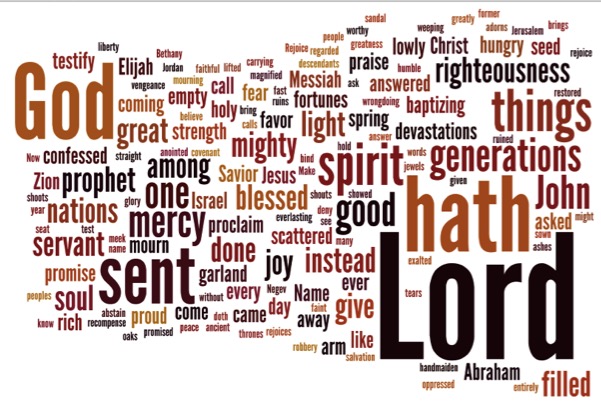3 Advent
Isa. 61:1-4, 8-11 • Ps. 126 or Canticle 3 or Canticle 15 • 1 Thess. 5:16-24 • John 1:6-8, 19-28
John is sent that all might believe not in him but through him. Eschewing eschatological titles that risk drawing attention away from his essential role, he asserts, “I am the voice of one crying out in the wilderness, ‘Make straight the way of the Lord’” (John 1:23). Lifting up his voice, he shows himself to be a witness to the light, the true light that is coming into the world. “He himself was not the light, but came to testify to the light” (John 1:8). The translation “to testify” is unfortunate. It obscures an important alliteration; the noun “witness” is closely related to the verb “to witness.” Behind both one hears the Greek word for “martyr.” John gives himself entirely as a martyr to his role as witness. He is the witness who has come to bear witness to “the one who is coming” (John 1:27).
It is quite possible to see in John’s title Witness and his action as one who witnesses a description of every Christian disciple in relation to the subject of faith, Christ our Lord. “What martyria and martyrein are may best be seen if we take as literally as possible the peri and genitive with which John’s Gospel often denotes the object of witness. Witness is truly and in the best sense speaking about a subject, describing it exactly and fully, pointing to it, confirming and repeating it, and all in such a way that the subject remains itself and speaks for itself, that it is not in any way absorbed in human speech or shouted down and overpowered by it. … As we come to faith, we cannot bypass or leap over the witness, the prophet, the apostle” (Karl Barth, Witness to the Word, p. 52). In this sense John the Baptist represents both every individual disciple and the Church itself as living witness to the Word. The Witness, confident in his calling, remains nonetheless humble. “He is not the light, but came to bear witness to the light.”
John bears witness to Jesus, the eternal Word of the Father. Jesus comes among us, enters all that we are, wraps us in his enfolding arms, and vests us with baptismal innocence and new life. So the Witness must witness to the arrival of joy. “I will greatly rejoice in the Lord, my whole being shall exult in my God; for he has clothed me with the garments of salvation, he has covered me with the robe of righteousness, as a bridegroom decks himself with a garland, and as a bride adorns herself with her jewels” (Isa. 61:10). Reject not this description. This is who we are in Christ. How can this be? Listen again: “He has clothed me with the garments of salvation.” It is God’s work, not ours. But the work accomplished is ours entirely. “It is no longer I who live, but Christ who lives in me” (Gal. 2:20).
Having put on Christ, a transformation begins, our habitual and actual sanctification, which, though adding nothing to the foundation of faith, is the necessary effect of imputed righteousness (see Richard Hooker’s treatise on justification). We grow; we change. The Lord causes us to grow and, mysteriously, this growth occurs in the intersection of human freedom and divine providence. “For as the earth brings forth its shoots, and as a garden causes what is sown in it to spring up, so the Lord will cause righteousness and praise to spring up before all the nations” (Isa. 61:11).
We are not the light. We bear witness to the light. And yet the light shines in our hearts, radiates in our deeds.
Look It Up
Read Canticle 15 (the Magnificat).
Think About It
My soul is “my whole being.”
TLC on Facebook ¶ TLC on Twitter ¶ TLC’s feed ¶ TLC’s weblog, Covenant ¶ Subscribe










